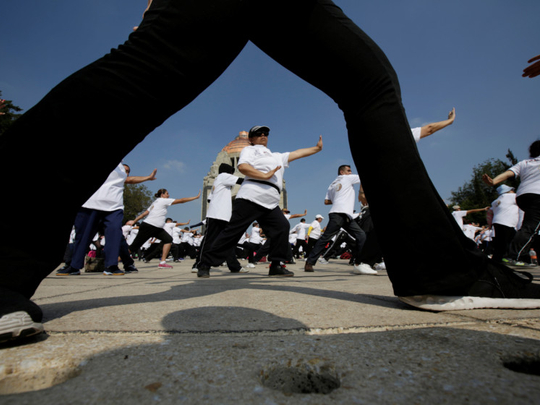
Practicing tai chi helps older people improve their balance and avoid falls, a review of studies has found.
Tai chi is a form of Chinese martial arts now practiced as exercise. It involves a specific program of graceful movements, accompanied by deep breathing and mental focus, that slowly move the center of balance from one leg to the other.
Researchers found 10 randomized trials analyzing the effect of tai chi on the incidence of falls or the time until an elderly person first has a fall. All studies compared tai chi to usual care or other treatments such as physical therapy, stretching or exercise.
The analysis, in The Journal of the American Geriatric Society, found that tai chi reduced the incidence of falls by 43 percent in those followed for less than a year and by 13 percent in those followed longer. There was no effect of tai chi on time to first fall, and there was some weak evidence that the practice reduced the number of falls that resulted in injury. Falls are a leading cause of broken hips and other serious problems in older people.
The lead author, Rafael Lomas-Vega of the University of Jaen in Spain, said that none of the studies showed any adverse effects of tai chi.
“We recommend tai chi as a safe practice for the prevention of falls,” he said. “And some reviews have found positive effects on chronic conditions such as cancer, osteoarthritis and heart failure.”
The incidence of stroke has declined in recent years, but only in men.
Researchers studied stroke incidence in four periods from 1993 to 2010 in five counties in Ohio and Kentucky. There were 7,710 strokes all together, 57.2 percent of them in women.
After adjusting for age and race, they found that stroke incidence in men had decreased to 192 per 100,000 men in 2010, down from 263 in 1993-94. But for women the incidence was 198 per 100,000 in 2010, down from 217 in 1993-94, a statistically insignificant change. The study is in Neurology.
Most of the difference was in ischemic stroke, the most common cause, resulting from a blocked blood vessel supplying blood to the brain.
No one knows why there has been no improvement in women, but the lead author, Dr. Tracy E. Madsen, an assistant professor of emergency medicine at Brown, said that some risk factors have a stronger effect in women than in men. Risk factors for stroke include high blood pressure, heart disease, diabetes and smoking.
“Maybe we’re not controlling risk factors to the same extent in women. Or maybe there’s a biological difference in the way these risk factors cause strokes in men versus women.”
In any case, Madsen said, “It’s important for women to know they are at risk. Stroke has been considered a male disease, but we know that it is very prevalent in women and has a high risk of disability and death.”
Women with insomnia or other sleep problems have an increased risk of giving birth prematurely, a new study suggests.
The observational study, in Obstetrics & Gynecology, included 2,172 women with a sleep disorder who gave birth between 2007 and 2012 to single children after 22-44 weeks of gestation. They were matched with the same number of women with the identical ethnic, health and behavioral characteristics, but who did not have a sleep disorder.
Overall, women with sleep disorders had a 14.6 percent prevalence of preterm birth (before 37 weeks of gestation), compared with 10.9 percent in those without a diagnosis. Those with insomnia had a 30 percent increased risk, and those with sleep apnea a 40 percent increased risk, compared with women without a sleep problem.
Women with insomnia were nearly twice as likely to deliver before 34 weeks gestation.
“More severe sleep disorders are often underdiagnosed, because poor sleep is common during pregnancy,” said the lead author, Jennifer N. Felder, a postdoctoral researcher in psychology at the University of California, San Francisco. “But for women having sleep problems that are severe, impairing and distressing, it’s important to talk to their health care providers.”










